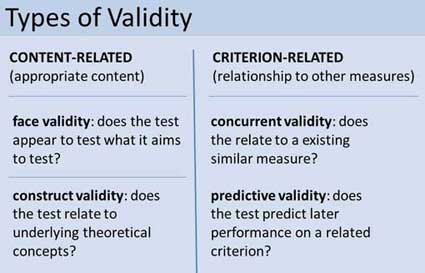Extraneous variables are factors other than the independent and dependent variables that may unintentionally influence the results of an experiment. They need to be controlled, minimized, or accounted for through careful experimental design and statistical analysis to avoid confounding the relationship between the independent and dependent variables.| Simply Psychology
Concurrent validity measures the extent to which a measurement is confirmed by a related measurement. It is a type of criterion-related validity that compares the test results to observations or measurements from other tests, surveys, or assessments| Simply Psychology
In psychology research, validity refers to the extent to which a test or measurement tool accurately measures what it's intended to measure. It ensures that the research findings are genuine and not due to extraneous factors. Validity can be categorized into different types, including construct validity (measuring the intended abstract trait), internal validity (ensuring causal conclusions), and external validity (generalizability of results to broader contexts).| Simply Psychology




